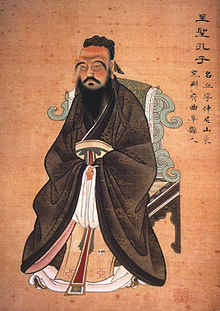Kong (surname)
The stroke order of 孔 | |
| Language(s) | Chinese |
|---|---|
| Origin | |
| Language(s) | Old Chinese |
| Word/name | 子, 乙 |
| Derivation | Fusion of 子 and 乙 |
| Other names | |
| Variant form(s) |
|
Kong (Chinese: 孔; Korean: 공) is a Chinese and Korean surname. It can also be written as Kung in Taiwan, Hung in Hong Kong, Khổng in Vietnam, and Gong in Korea. There are around 2.1 million people with this surname in China in 2002, representing 0.23% of the population.[1] In 2018, it was the 97th-most common surname in China.[citation needed] It is the 25th name in the Hundred Family Surnames poem.
Kong is most notable as the surname of Confucius and his descendants, whose family tree is the world's longest, covering over 2,500 years and more than 80 generations, in two million entries as of 2009.[2][3] The main line of descent traditionally held the title of Duke Yansheng, which was changed to the title of the first Sacrificial Official to Confucius in the 20th century. This title is currently held by Kung Tsui-chang.
Kong may also be the English transliteration of a rare Chinese surname 空, or a less common form of the Gong surnames such as 龔, 貢 and 弓.
Origin[edit]

The character for the Kong surname was derived from the Zi (子) family name. The founder of the Shang Dynasty, Tang of Shang whose family name was Zi, had the temple name of Taiyi (太乙). His descendants fused the character Zi (子) to Yi (乙), forming the character Kong (孔) which eventually became a surname.[4] It first appeared during the Zhou Dynasty as the courtesy name Kongfu (孔父) of a noble in the State of Song named Jia (嘉), said to be a descendant of the Tang of Shang. Kongfu Jia was murdered, and his son escaped to the State of Lu where he adopted Kong as the name of his clan.[4] His family settled in Qufu and Confucius was one of his descendants.
The Kong surname may also have originated from a number of other sources. Others had adopted Kong as their surname because it was part of their ancestors' name. For example, in the State of Zheng, two of Duke Mu of Zheng's (鄭穆公) sons (surname Ji) (姬), had Shikong (士孔) and Zikong (子孔) as their respective courtesy names, and their descendants took Kong as their surname.[5] Similarly, there was a noble in the State of Chen named Kongning (孔寧, originally of surname Gui (媯)), and another in the State of Qi named Konghui (孔虺, originally of surname Jiang (姜)); the descendants of both also adopted the surname Kong.
Some of the non-Han Chinese people used Kong as their surname, such as the Derung, Jingpo, Tibetan, and the Yugur people. Various Manchu clans also simplified their surnames to Kong.
Notable bearers[edit]
- Confucius (Kong Qiu)
Kong[edit]
- Kong Anguo (156 – c. 74 BC), Confucian scholar and government official of the Western Han dynasty
- Augustine Kong, statistical geneticist
- Kong Ji (481–402 BC), Chinese philosopher and grandson of Confucius
- Kong Qingdong
- Kong Rong
- Kong Shangren
- Kong Tai Heong
- Kong Yingda
- Kong Youde
- Kong Zhaoshou
Kung[edit]
- H. H. Kung (1881–1967), banker and politician in the Republic of China
- H. T. Kung (born 1945), Taiwanese-born American computer scientist
- Kung Te-cheng (1920–2008), Duke Yansheng, Confucian ceremonial official
- Kung Tsui-chang (born 1975), Confucian ceremonial official
Gong[edit]
- Gong Chan-shik, member of South Korean boy group B1A4
- Gong Hyo-jin (孔曉振), South Korean actress
- Gong Ji-young (孔枝泳), South Korean female writer
- Gong Min-ji (known as Minzy), South Korean soloist, dancer, rapper, and former member of South Korean girl group 2NE1
- Gong Yoo (孔劉), South Korean actor
- Gong Oh-kyun (Korean: 공오균; Hanja: 孔五均), former South Korean football player and a professional coach, manager of the Vietnam national under-23 football team
- Gong Hyun (), South Korean Gooner
Hung[edit]
- William Hung (Chinese: 孔慶翔; pinyin: Kǒng Qìngxiáng), American singer from Hong Kong
See also[edit]
References[edit]
- ^ 袁义达, 张诚 (2002). 中国姓氏: 群体遗传和人口分布. East China Normal University Press. p. 99. ISBN 9787561727690.
- ^ 周静 (2008-10-31). "New Confucius Genealogy out next year". China.org.cn.
- ^ "Confucian family tree 'triples'". BBC. 25 September 2009.
- ^ a b Fu Chinjiang (2007). Origins of Chinese Names. Asiapac Books. p. 80. ISBN 978-9812294623.
- ^ 孔德懋 (2000). 孔子家族全书: 家事本末. 辽海出版社.
